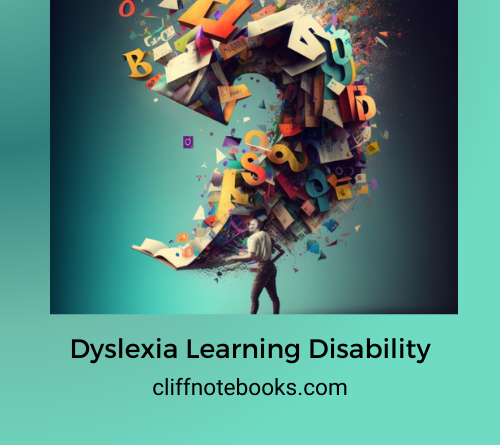Dyslexia Learning Disability | Cliff Note Books
Dyslexia is a learning disability that affects a person’s ability to read, write, and spell. It is a complex condition that can manifest in different ways, but one of the most common difficulties for people with dyslexia is reading. Dyslexia can affect many aspects of reading, including decoding, fluency, and comprehension.
As a learning disability, dyslexia can impact a person’s educational and career opportunities. In school, students with dyslexia may struggle with reading assignments, spelling tests, and written assignments. They may require additional support and accommodations to help them succeed, such as extra time on tests or the use of assistive technology.
In the workplace, people with dyslexia may struggle with written communication, such as emails and reports. They may require accommodations such as speech-to-text software or the assistance of a proofreader to ensure that their work is accurate and professional.
It’s important to note that dyslexia does not affect intelligence. People with dyslexia may have strengths in other areas, such as creativity, problem-solving, or visual-spatial skills. However, the challenges of dyslexia can impact their ability to demonstrate their full potential in academic and professional settings.
Fortunately, there are strategies and accommodations that can help people with dyslexia succeed. One of the most effective strategies is a structured literacy approach, which focuses on teaching phonics and decoding skills in a systematic and explicit way. This can help people with dyslexia improve their ability to recognize and decode words, which can in turn improve fluency and comprehension.
Assistive technology can also be helpful for people with dyslexia. Text-to-speech software, for example, can read text aloud, which can make it easier for people with dyslexia to access and comprehend written information. Other types of assistive technology, such as speech-to-text software and spellcheckers, can also be helpful for people with dyslexia.
It’s important to remember that dyslexia is a complex condition that affects people in different ways, and that with the right support, people with dyslexia can achieve success in school, work, and everyday life. Teachers, employers, and others can play a role in supporting individuals with dyslexia by providing accommodations and understanding their unique needs.
Dyslexia is a learning disability that can impact a person’s ability to read, write, and spell. It’s important to understand that dyslexia does not affect intelligence and that people with dyslexia have strengths in other areas. By providing support and accommodations, we can help people with dyslexia reach their full potential.
People with dyslexia can have average, above-average, or below-average intelligence, just like people without dyslexia. Dyslexia is a specific learning disability that affects language processing, not overall cognitive abilities.
In fact, some research has suggested that people with dyslexia may have strengths in certain areas, such as creativity, problem-solving, and visual-spatial skills. These strengths can be valuable in many careers, such as art, design, engineering, and science.
However, the challenges of dyslexia can impact a person’s ability to demonstrate their full potential in academic and professional settings. For example, students with dyslexia may struggle with reading assignments, spelling tests, and written assignments, which can lower their grades and limit their opportunities for higher education.
In the workplace, people with dyslexia may struggle with written communication, such as emails and reports. This can impact their ability to advance in their careers, even if they have the skills and knowledge to succeed.
Fortunately, there are strategies and accommodations that can help people with dyslexia succeed. One of the most effective strategies is a structured literacy approach, which focuses on teaching phonics and decoding skills in a systematic and explicit way. This can help people with dyslexia improve their ability to recognize and decode words, which can in turn improve fluency and comprehension.
Assistive technology can also be helpful for people with dyslexia. Text-to-speech software, for example, can read text aloud, which can make it easier for people with dyslexia to access and comprehend written information. Other types of assistive technology, such as speech-to-text software and spellcheckers, can also be helpful for people with dyslexia.
Dyslexia is a specific learning disability that affects language processing, not overall intelligence. People with dyslexia can have strengths in certain areas, and with the right strategies and accommodations, they can succeed in academic and professional settings. It’s important to understand that dyslexia does not define a person’s intelligence or potential, and that by providing support and accommodations, we can help people with dyslexia reach their full potential.
